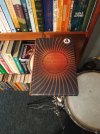@Scorpio93 - I'm a big fan of '
The Meditations' - personally I don't think it matters at all what order you read it in. A long way back in this thread it was discussed - hence the following - extracted from an essay I wrote at Uni - minus the Hunter S. Thompson quotes.

. You are welcome to read it, should you wish. Cheers - I.
‘
The Meditations’ of Marcus Aurelius Marcus Aurelius Antonius Augustus - (b. 26/4/121 - d. 17/3/180 ce) - Roman emperor (r.-161 - 180 ce) - soldier and Stoic philosopher.
Aurelius - half Spanish and half Italian - by modern definition - was the last emperor of the period known as the ‘
Pax Romana’ - a time of relative stability - note the word - relative - the system he inherited was dependent on some degree of expansion at all times - and therefore - conflict. He had to deal with a resurgent Parthian empire in the east - and probably was the first to properly understand that the noisome myriad of Germanic tribes were going to end up as an existential crisis for the ‘
augusti’ that would follow him - which they did. His ‘
Meditations,’ are contained in twelve sections - composed in Greek - each drawn from a separate period in the author’s life - it is non-linear in chronology - it is not a book in the modern sense - more
‘notes to self’ - on how to deal with the trials of life - and remain a good man - in form they run from long paragraphs - to single sentences - like this -
‘
Often injustice lies in what you aren't doing, not only in what you are doing.’ - IX.5.
It is not actually called ‘
The Meditations,’ - it never originally had a title - as it wasn't intended to be published - or read by anyone except Aurelius - the name has just stuck - suitable enough - I think. There is no doubt that he was deeply sincere in his quest to live the good Stoic life - which begs the fairly obvious question - why become emperor? Not a position known for its association with a virtuous life - less than ideal for a man more given to quiet contemplation? - he addressed this issue himself - regarding accepting the title as his duty. He felt he had no choice in the matter - being largely born to it - his ‘
fate.’
‘Be like a rocky promontory against which the restless surf continually pounds; it stands fast while the churning sea is lulled to sleep at its feet. I hear you say, "How unlucky that this should happen to me!" Not at all! Say instead, "How lucky that I am not broken by what has happened and am not afraid of what is about to happen. The same blow might have struck anyone, but not many would have absorbed it without capitulation or complaint.’ - IV.49.
Stoicism is a Hellenistic form of philosophy and derives from the teaching of Zeno of Citium - technically Phoenician by his place of birth - in the 3rd century bce - it was immediately popular in his time - and underwent development - subsequently - taken up by the Roman elite - before Aurelius - Seneca principally - as close to an original thinker as the empire produced - it fell to the wayside after Constantine Christianised the empire in the 4th century ce. In my opinion - it was heavily influenced by the earlier Cynics - with the central tenet of living in harmony with nature as the way to happiness. The name Stoic derives from a ‘
painted colonnade’ - a ‘
stoa’ - such as was found at the northern end of the ‘
agora’ in Athens - where Zeno discussed matters with his students - unlike Plato and Aristotle he didn’t have the funds to teach indoors. It was - and remains - a complete philosophical system - underpinned by a distinct form of physics, logic and ethics.
‘
A person who doesn't know what the universe is, doesn't know who they are. A person who doesn't know their purpose in life doesn't know who they are or what the universe is. A person who doesn't know any of these things doesn't know why they are here. So what to make of people who seek or avoid the praise of those who have no knowledge of where or who they are?’ VIII.52.
The basics - the universe/nature/god - be careful with the last of the interchangeable terms - they used it - but meant a completely different thing to the way we might understand it today - is a reasoning entity - eternal but also - confusingly - cyclical at the same time. The world we experience is made up of two types of matter - the passive - available for any purpose - that needs to be mixed with the active - the ‘
logos’ - universal reason - they also called it ‘
fate’ - but again that is problematic if you speak modern English - it has shifted considerably in meaning - observe the transit from the Latin ‘
fides’ to ‘
faith,’ for example. Individuals are perishable - we come from the void and return there after but a short time. There is no space for heaven or hell in the system - we resort to the primal matter we are composed of.
‘
Of the life of man the duration is but a point.’ - II.17.
So - what does this all mean? - good question. There is no value in trying to live a life that does not understand ‘
nature,’ - their meaning - not ours - to do so would be folly and inviting unhappiness - such things as anger, pain, fame and wealth are transient illusions that a wise man can put aside - to the Stoic - they are simply irrelevant - considered - then left behind. The key thing about Stoicism is to live a good life - one’s behaviour controlled by wisdom, courage, justice and temperance - the cardinal virtues. It is an entirely practical system - in my opinion - I would venture - more relevant now than ever - we live in a culture that has discarded some fairly obvious truths - one largely predicated on the sensory illusions Stoicism points out - the fallacy of - happiness achievable through - need - consumption - vanity - novelty - avarice - hubris - the destruction of the ‘
universe’ - our biosphere - we all live in Macfarlane’s ‘
Anthropocene’ now. A nightmare vision of Yuval Noah Harari - horribly twisted on dangerous drugs. Algorithms - like germs to the Greeks - an enemy we can neither see nor fight. The last words - of course will be for Aurelius - I will try and remember this - the next time I go out into the world -
‘bat country’ - and the ‘
rat bastard psychotics’ set about me again - thank you - I.
‘
When you wake up in the morning, tell yourself: The people I deal with today will be meddling, ungrateful, arrogant, dishonest, jealous, and surly. They are like this because they can't tell good from evil. But I have seen the beauty of good, and the ugliness of evil, and have recognised that the wrongdoer has a nature related to my own—not of the same blood or birth, but the same mind, and possessing a share of the divine.’ - II.1.



